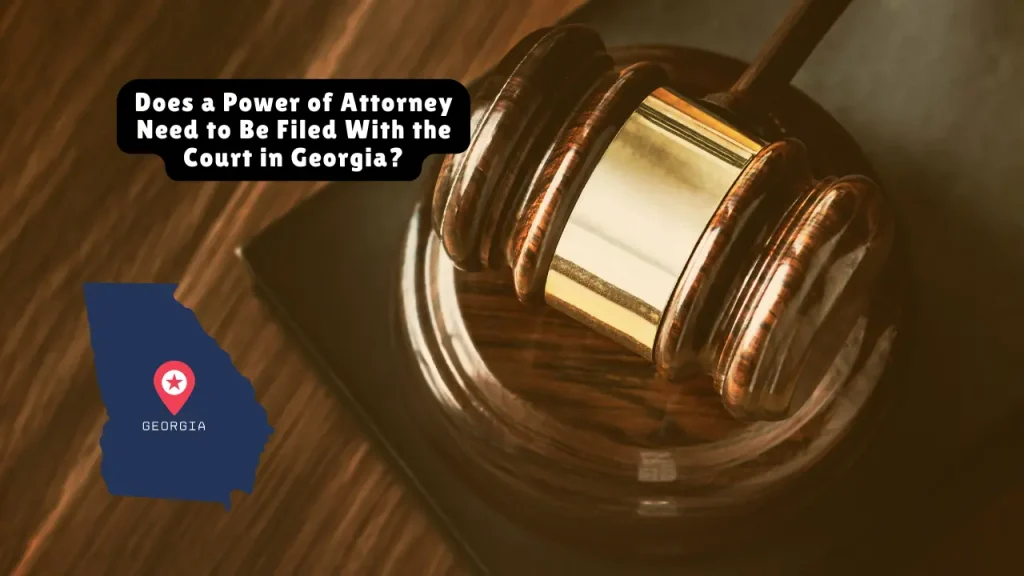Does a Power of Attorney Need to Be Filed With the Court in Georgia?
When creating a power of attorney (POA) in Georgia, a common question arises: Must this document be filed with the court to be valid? The answer depends on the type of POA and its intended use. This article clarifies Georgia’s filing requirements, explores gaps in existing resources, and provides actionable insights for estate planning, guardianship, and financial management.
Table of Contents
Key Takeaways: Georgia POA Filing Rules
- Most POAs Do Not Require Court Filing
In Georgia, general, durable, healthcare, and limited POAs typically do not need to be filed with the court to be legally valid. Their enforceability hinges on proper execution (signatures, witnesses, and notarization) rather than court registration.
- Exception for Real Estate Transactions
If a POA grants authority to manage or sell real property, Georgia law requires filing a copy with the clerk of the superior court in the county where the property is located. This ensures third parties (e.g., title companies) recognize the agent’s authority.
- Optional Filing for Safekeeping
While not mandatory, some principals file their POA with the court to create a public record. This can prevent disputes or delays if the original document is lost or challenged.
Georgia’s Legal Principles: Breaking Down the Requirements
Under the Georgia Uniform Power of Attorney Act (UPOAA), POAs are governed by strict execution standards but flexible filing rules. Here’s what you need to know:
1. Execution Over Filing
A POA’s validity in Georgia depends on:
- Mental Capacity: The principal must understand the document’s implications.
- Signatures: The principal, one witness, and a notary must sign (two witnesses for healthcare POAs).
- Durability: POAs are durable by default unless stated otherwise, meaning they remain valid if the principal becomes incapacitated.
Filing is only mandated for real estate-related POAs, as unrecorded documents may be rejected during property transactions.
2. Third-Party Acceptance
Georgia’s UPOAA (effective 2017) strengthens enforcement:
- Banks and institutions must accept valid POAs within 7 business days unless they provide a legally justified refusal.
- Courts can order compliance and award attorney fees if third parties wrongfully reject a POA.
Related article for you:
Disadvantages of a Durable Power of Attorney
Blake Lively vs Justin Baldoni: Lawsuits Alleging Sexual Harassment, Defamation, and a $400M Counterclaim

Addressing Content Gaps: What Other Resources Miss
Many articles overlook critical nuances. For example:
- Digital Assets: Georgia’s POA laws now include authority over digital assets (e.g., cryptocurrencies, social media) under the definition of “property”.
- Springing POAs: While allowed, these “trigger” upon incapacity and may face delays if a physician’s certification is required.
- Revocation: A POA can be revoked by submitting a written notice to the agent and institutions, but revocation isn’t effective until filed in real estate cases.
Real-Life Example: Avoiding Guardianship
Consider a Savannah resident, John, who appointed his sister as agent via a durable financial POA. When John suffered a stroke, his sister used the POA to manage his bills and sell his condo. Because the POA included real estate authority, she filed it with Chatham County’s clerk. Without this step, the title company might have rejected the sale, forcing a costly guardianship process.
Expert Insights
Estate attorney Paul Black emphasizes:
“Filing a POA for real estate isn’t just a formality—it’s a safeguard. Without it, families risk delays during urgent transactions, which can derail financial stability.”.
Sarah Siedentopf, an Atlanta estate lawyer, adds:
“The 2017 UPOAA was a game-changer. It empowers agents to hold institutions accountable, reducing the need for court intervention”.
Conclusion
In most cases, Georgia POAs do not require court filing—proper execution is sufficient. However, real estate POAs must be recorded locally to ensure seamless transactions. Proactive planning, including consulting an estate attorney and pre-filing where necessary, can prevent legal hurdles. Always revisit your POA periodically to align with life changes and evolving laws.
For personalized guidance, refer to Georgia’s statutory forms (O.C.G.A. §10-6B-70) or consult a certified elder law attorney.
Sources:
- LegalZoom: Georgia POA Requirements
- Nolo: Georgia POA Laws
- Siedentopf Law: UPOAA Overview
- The Law Office of Paul Black
About the Author

Sarah Klein, JD, is an experienced estate planning attorney who has helped clients with wills, trusts, powers of attorney, and probate matters. At All About Lawyer, she simplifies complex estate laws so families can protect their assets, plan ahead, and avoid legal headaches during life’s most sensitive moments.
Read more about Sarah
